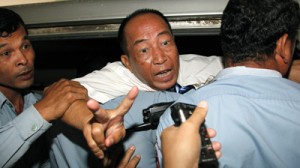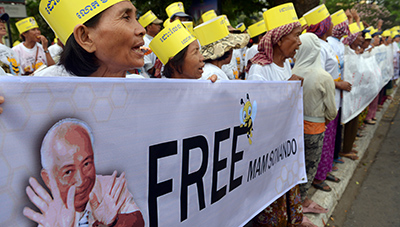
On May 16th, 2012 the Cambodian government conducted a raid of Kratie Province, located in northeast Cambodia. Hundreds of police officers and soldiers bombarded the province, armed with weapons and the help of a military helicopter. Hundreds of Kratie residents were displaced from their land during this government-supported raid, which the government defended by claiming that members of Kratie Province were planning to secede from Cambodia and that the raid was done as a preemptive attempt to curb the secessionist movements in the province. However, there is no evidence that Kratie residents wanted to secede from Cambodia, and no residents were armed. Throughout the raid, police and military prohibited the United Nations, NGOs or any journalists from being present. A 14-year-old girl was killed in Kratie that day, and many residents of the province were evicted and displaced from their homes.
On June 25th, 2012, about a month after the raid in Kratie Province, Mam Sonando a famous Cambodian journalist and owner of the Beehive radio station, an independent radio station based in the Cambodian capital city of Phnom Penh, stated that Cambodian officials were “guilty of crimes against humanity due to their forced evictions and displacements in Kratie province”. The Beehive radio station also stated that there had been communication with the International Criminal Court (ICC) regarding these grave human rights violations.
On June 26th, 2012, the day after the Beehive radio station accused Cambodian officials of committing crimes against humanity during the raid, Prime Minister Hun Sen publically called for the arrest of Sonando and accused his organization, The Association of Democrats, of being involved with the secession attempts in Kratie province. The Association of Democrats, a Cambodian NGO that Mam Sonando founded, works to “protect human rights and democracy in Cambodia” by making sure all Cambodians have access to ID cards for easier access to voting in national elections. Some residents of Kratie province are members of the Association of Democrats but, apart from this connection, Mam Sonando has no association with Kratie Province associates or the alleged secession attempt. Sonando “has never been to Kratie province, does not know any of the inhabitants, and was abroad in France when the protest took place.” However, on July 15th, 2012 Mam Sonando was arrested at his Beehive radio station, in Phnom Penh. LICAHO, a Cambodian human rights organization, explained all of Sonando’s charges in a briefing stating, “Sonando was charged under six articles of Cambodia’s Penal Code. He stands accused of crimes ranging from leading an insurrectionary movement and incitement to take up arms against the state, to obstruction of public officials. If convicted on all counts, he faces seven to thirty years in prison.”
Sonando was wrongfully charged with being involved in a secession attempt in a province with which he has little association. At 72 years old, he is fully aware of the injustices committed by the Cambodian government. Sonando was arrested in 2003 for allegedly inciting riots and in 2005 for defamation. All of his charges are linked with his independent news reporting which receives no funding from the government and therefore is not obliged to blindly praise the government’s actions. Free media in Cambodia is rare and when it emerges Prime Minister Hun Sen has been quick to suppress it.
Sonando holds both French and Cambodian citizenship and was able to escape the Khmer Rouge period, the genocide from 1974-1979 led by Pol Pot, which is often referred to as the Cambodian holocaust. During the years of Khmer Rouge rule in Cambodia, over two million Cambodians died. From 1963-1993 Sonando lived in France, where he received his education. When he returned to Cambodia in 1993, Sonando immediately attained a broadcasting license and founded his Beehive radio station the same year. His radio station was originally used to affiliate with the new political party in Cambodia, The Beehive Democratic Society Party. However, after an unsuccessful attempt of the Beehive party to win a position in a political office, Sonando changed the mission of his radio station and since then it has been used as a source of independent media that does not promote any political party during broadcastings. However, it is well known that Sonando is in support of Cambodia’s opposition party. The opposition party of Cambodia is considered the more liberal party and in 2004 joined forces with the Human Rights Party of Cambodia. Politicians such as Sam Rainsy and Mu Sochua, who are considered controversial by the current ruling government of Cambodia, mainly lead the Human Rights Party. The current Prime Minister of Cambodia, Mister Hun Sen, is the head of the Cambodian People’s Party, CPP, and implements an authoritarian approach to suppress the voice of the opposition party.
Although Sonando is based in Phnom Penh, he is well respected by civil society members nationally and internationally. He is committed to reporting on human rights issues and ensures the Beehive radio station provides a reliable source of independent media. Cambodia is a country in which free journalism presented without fear or favor is hard to come about. Human Rights Watch, an international NGO based in New York that focuses on advocacy and human rights issues, describes the Beehive Radio station as “a key platform for promotion of human rights and democracy in Cambodia”. Despite the international praise he receives for his work promoting democracy in Cambodia, the Cambodian government still views Sonando and those asking for his immediate release from jail as a threat to the country. Rights groups and the majority of the Cambodian population view the arrest of Sonando as highly politically motivated, an infringement of rights, and an approach taken by the government to silence one of the few critical voices popularized throughout Cambodia. The government responded to rights groups by saying that Sonando was arrested “ in conformity with the law” and alleged faultfinders of attempting to challenge the law.
Prime Minister Hun Sen has largely led Cambodian politics since 1985. The Prime Minister has repeatedly made sure that Cambodian journalists, and activists, who highlight the flaws of the state, are imprisoned or somehow disappear overnight without a trace. This recently happened in May 2013 when an activist was killed by a military police when working with a reporter to gain more information on illegal logging in the country’s mountains. It is rare that a week goes by without an article about an imprisoned, missing, or killed journalist reported in the Phnom Penh Post or the Cambodia Daily, two English language newspapers in Cambodia. Defined by Amnesty International as a “prisoner of conscience”, Sonando is one of many journalists in Cambodia to be imprisoned for reporting the news. So what is the future with this case? Who carries the burden of making sure these problems stop occurring? Do the people of Cambodia hold the power or is this the role of international actors and global civil society?
Fortunately Sonando has been released from prison. However, justice was not served; his release initially tasted sweet but left most Cambodians with a bitter aftertaste. On Friday March 15th, 2013 Sonando was released from prison; it was an exciting time to be in Phnom Penh as over 1,000 of his supporters lined the muddy and pothole-filled street leading to Phnom Penh’s Prey Sar prison. Sonando walked out of prison with his hands pressed together, bowing down to his supporters in the traditional and respectful greeting manner of the Khmer people. Sonando’s stride was confident and cool as he took his first steps out of jail wearing a baseball cap that bore the name of his NGO “Association of Democrats.” With the help of a megaphone he addressed his audience, comprised of both supporters and journalists, and said, “Firstly, I would like to thank all Cambodian people in Cambodia and abroad. I am happy that I have been freed. But freedom nowadays is not enough, not 100 percent yet. Our people need freedom.” Sonando was carried down the street on the shoulders of the happy crowd shouting and celebrating his release. As Sonando stated it is because of the people that he was released, not because of the court or improvements in the Cambodian justice system. His release is less of a sign of the country becoming more democratic and rather an example of how international pressure can influence government action. Although this may be an exciting example of how international civil society can make a difference all over the world, this is not sustainable and it does not help to encourage or empower an already oppressed population. If a society continues to feel like their efforts to make a change go unheard they will inevitably become disenchanted with the system and find comfort in conforming versus standing out.
The release of Sonando was not simple. It was not achieved solely through online petitions and people wearing “Free Mam Sonando” T-shirts. Well-known international NGOs like The Human Rights Watch and Amnesty International played a role in the release of Mam Sonando however, even their presence was not enough. Leaders of powerful countries had to personally get involved before there was any real hope that Sonando could be released. During a meeting between Prime Minister Hun Sen and President Barack Obama in November 2012 while visiting Cambodia, President Obama personally brought up the Mam Sonando case by name and urged Hun Sen to release him, implying that Sonando was a political prisoner. The Prime Minister of France also urged the release of Sonando. Although the role of many countries was crucial in urging the release of Mam Sonando, there are hundreds of other journalists in Cambodia who are not lucky enough to have both French and Cambodian citizenship, journalists without their own radio stations, without large national and international support bases, what will happen to them? Based on similar cases with lesser-known journalists, they would be lucky to even receive a trial let alone be released from prison.
Justice has not been served, and the court’s release of Sonando was not “just” behavior because the court’s decision was not made based reason. Rather, the government was pressured by an overwhelming amount of international pressure. But what does this say to the effectiveness of Cambodian civil society, arriving to protest the charges of Sonando on their motorcycles as opposed to the Air Force One? Largely, Cambodian people do not feel like this victory is a result primarily influenced by their efforts.
Many community organizers and human rights groups in Cambodia fear that Khmer people, becoming increasingly certain that little can be done without powerful international presence, will start to feel less empowered to rally around issues that they care about. Without a strong and legitimate domestic justice system, similar cases may not be resolved in the future unless, the international community continues to stay involved, which is not sustainable long-term. With the recent national elections in Cambodia in late July, the presence of independent media was crucial. Unfortunately, many cases of voter fraud occurred however, there was an outlet for journalists to share this news despite it reflecting the ruling party in an unfavorable light. Receiving news that is presented without fear or favor is crucial to gradually progress toward democracy in Cambodia. It is undoubtedly a task that Sonando and many other journalists work hard to deliver. Although a strong system of justice may not have freed Mam Sonando, his freedom is a step in the right direction, and one that deserves to be celebrated.
Kristen Miller
International Affairs ’15
http://www.licadho-cambodia.org/reports/files/170LICADHOBriefingPaper-MamSonandoExplained2012-English.pdf
http://en.rsf.org/cambodge-cambodian-journalist-s-immediate-08-03-2013,44186.html
http://www.pen.org/rapid-action/2013/03/21/journalist-mam-sonando-released-appeal
http://www.licadho-cambodia.org/reports/files/170LICADHOBriefingPaper-MamSonandoExplained2012-English.pdf
http://www.phnompenhpost.com/2013031461925/National/mam-sonando-to-be-freed.html
http://www.nzweek.com/world/cambodian-radio-station-owner-to-be-freed-this-week-54275/
http://www.nzweek.com/world/cambodian-radio-station-owner-to-be-freed-this-week-54275/



